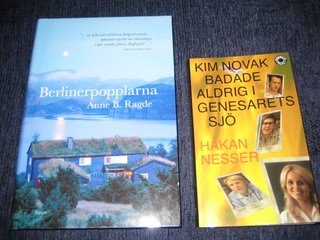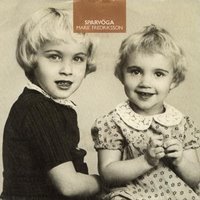Showing posts with label literature. Show all posts
Showing posts with label literature. Show all posts
Saturday, October 20, 2007
Liste de Ventes - France
Puis je regarde la liste de meilleures ventes de romans en France fin septembre: Muriel Barbery, Amélie Nothomb, Harlan Coben, Yasmina Reza, Philippe Claudel, Stephen King, John Le Carré, Daniel Mendelsohn, Guillaume Musso et Franck Thilliez - la moitié non-francais.
Liste de ventes - Suède
Avec une population de 9 millions habitants, un niveau d'éducation plutôt haut ainsi que la connaissance des langues et d'autres cultures, on pourrait croire que cela se montrera dans la lecture en Suède, mais non. Je regarde la liste de meilleures ventes de romans en Suède octobre 2007 et parmi les 10 premiers il n'y a qu'un seul écrivain étranger: Khaled Hosseini. Les autres: Liza Marklund, Stieg Larsson, Jan Guillou, Karin Wahlberg, Kajsa Ingemarsson, Leif GW Persson, Mari Jungstedt, Arne Dahl, Camilla Läckberg - la plupart des livres sont des romans policiers.
Thursday, October 18, 2007
Laureates II
...and the Man Booker Prize 2007 went to the Irish author Anne Enright, for The Gathering.
I quote the site: "The Gathering is a family epic. It is also a sexual history: tracing the line of hurt and redemption through three generations – starting with the grandmother, Ada Merriman – showing how memories warp and family secrets fester. This is a novel about love and disappointment, about thwarted lust and limitless desire, and how our fate is written in the body, not in the stars."
This makes me think of Joyce Carol Oates and her Rape: a Love Story. Must read. The Gathering.
I quote the site: "The Gathering is a family epic. It is also a sexual history: tracing the line of hurt and redemption through three generations – starting with the grandmother, Ada Merriman – showing how memories warp and family secrets fester. This is a novel about love and disappointment, about thwarted lust and limitless desire, and how our fate is written in the body, not in the stars."
This makes me think of Joyce Carol Oates and her Rape: a Love Story. Must read. The Gathering.
Laureates I
By now, everyone knows that Doris Lessing will be the one to receive the Nobel Prize in literature in Stockholm December 10th. People ask why the academy and the nobel committees wait so many years before rewarding the potential laureates. One reason is that they want to see sustainable success and not " one hit wonders". Often times the Nobel Prize in literature rewards the work of a lifetime and not one single piece of work. However, the work of Lessing is heterogenus and contains many categories, even science fiction, which is not so common in this context.
Doris Lessing will be the oldest laureate ever to receive the Nobel Prize in Literature and Leonid Hurwicz that will receive the Prize in Economic Sciences will be the very oldest (90 yrs) in all categories.
Doris Lessing will be the oldest laureate ever to receive the Nobel Prize in Literature and Leonid Hurwicz that will receive the Prize in Economic Sciences will be the very oldest (90 yrs) in all categories.
Tuesday, October 09, 2007
Nobel Prize week
We are in the week of Nobel Prize announcements, it always catches my interest. Thursday is the day for literature. The betting odds rank Philip Roth, Claudio Magris, Haruki Murakami, Thomas Tranströmer, Amos Oz, Joyce Carol Oates as the more likely. Among these, the Swedish poet Thomas Tranströmer and Joyce Carol Oates are personal favourites.
Man Booker Short List 2007
I'm in an intense work period since after summer holiday but it's time for an update. The short list for the Man Booker Prize for Fiction 2007 was released a month ago and in a week the laureate will be announced. The six finalists are:
Darkmans by Nicola Barker
The Gathering by Anne Enright
The Reluctant Fundamentalist by Mohsin Hamid
Mister Pip by Lloyd Jones
On Chesil Beach by Ian McEwan
Animal’s People by Indra Sinha
Darkmans by Nicola Barker
The Gathering by Anne Enright
The Reluctant Fundamentalist by Mohsin Hamid
Mister Pip by Lloyd Jones
On Chesil Beach by Ian McEwan
Animal’s People by Indra Sinha
Sunday, January 07, 2007
Best reads 2006

Back on track. I kept on reading but didn't blog the past months. However, during holidays I summarized the year and read a lovely novel: Berlinerpopplarna (The Berlin Poplars) by Anne B Ragde, Norwegian author. The novel has been a great success in Norway and it's not difficult to understand why. Best read in Swedish was Hakan Nesser's Kim Nowak badade aldrig i Genesarets sjö. Of course I did not read exclusively Scandinavian literature...another favourite is Joyce Carol Oates, Rape A Love Story. So what makes literature that I enjoy? Good language. I am not so fund of endless dialogues, common in chick lit etc. Intriguing story, preferably woven in more than one layer. That also goes for the characters that should be made up with psycological insights, in a way that makes me want to get to know them better. And reflect upon human nature.
Sunday, March 05, 2006
1960s - Take a stand
The early 60s, Swedish literature was still under the influence of relativism and unfaithfulness but during the second part of the 1960s, the political and economical debate is introduced in the arts. New, more genuine forms are sought and the “aristocracy-modernism” is dismissed when turning the back towards academia and media. Socialrealistic reporterprose and ideological criticism becomes in fashion. Literature is no longer art but serves to deliver emotions, in a functional way. Arts should serve people, as an act of solidarity.
The notion of culture broadens. The literary critic is now a contemporary intellectual as opposed to yesterday’s esthetical judge. The French structuralism is introduced in Sweden and along comes the “nouveau roman”. Important genres in the Swedish literature of the 60s are journey accounts (Sven Lindqvist, Jan Myrdal), reports and documentaries (PC Jersild, Sara Lidman) where interviews are common and also experimental prose (Torsten Ekbom).
The notion of culture broadens. The literary critic is now a contemporary intellectual as opposed to yesterday’s esthetical judge. The French structuralism is introduced in Sweden and along comes the “nouveau roman”. Important genres in the Swedish literature of the 60s are journey accounts (Sven Lindqvist, Jan Myrdal), reports and documentaries (PC Jersild, Sara Lidman) where interviews are common and also experimental prose (Torsten Ekbom).
Saturday, February 25, 2006
1950s - Come out and play
During the 1950s the serenity in Swedish literature turns into a play with esthetics. The 50s is a time of freedom and contradictions. It’s pluralism, ironic romance and playfulness. Different strategies and voices are tried out. A new foundation for society after 2nd world war is sought. The young author is usually an academic who is practising the craftsmanship of creating literature. However, there is no “generation” of the 50s that steps forward. Authors to be mentioned are: Pär Rådström, Birgitta Trotzig, Willy Kyrklund, Sara Lidman and Lars Gyllensten.
The American New criticism is introduced in Sweden by the leading critic Bengt Holmqvist. Ezra Pound grows popular, Roland Barthes less read.
The American New criticism is introduced in Sweden by the leading critic Bengt Holmqvist. Ezra Pound grows popular, Roland Barthes less read.
1940s - Anguish
Anguish is the key word of the Swedish literature in the 1940s. Stig Dagerman (1923-54) is the Master. The serenity of human existence is a main theme. Relativism of values lead to a renewed focus on moral issues. What the 40-talists share in common is the fear of illusions and false notions. This drives through a reduction of the image of the human being and the harder scrutinized, the larger the chance to find the real, but this also increases the anxiety.
The literary 1940s end in 1954 when Stig Dagerman commit suicide and the last volume of lyrics from Erik Lindegren is published. Lars Ahlin finishes off the classic modernism by claiming that literature is language, not a medium. He is experimenting with the prose in a way that will be picked up by the constructivists later on in the 1960s.
The literary 1940s end in 1954 when Stig Dagerman commit suicide and the last volume of lyrics from Erik Lindegren is published. Lars Ahlin finishes off the classic modernism by claiming that literature is language, not a medium. He is experimenting with the prose in a way that will be picked up by the constructivists later on in the 1960s.
Sunday, February 19, 2006
70s literature in Sweden
During this weekend I have been busy with Swedish prose from the 1970s. The 70s hardly exist at all in Swedish literature as the 60s is considered to have ended in 1976 and the 1980s was a higher profiled period. In early 70s the publishing industry suffered from low/non-profits. Critics during the preceding years had claimed that fiction was all lie and crap. But eventually, this decade came with a renaissance for fiction and story-telling. Young authors left the political problems for existential ones. Prominent Swedish authors from the 1970s are such as: Jacques Werup, Ernst Brunner, Niklas Rådström, Klas Östergren.
I chose to read Lars Gustafsson, who is a highly academic author and a central figure especially in the 1960s . With Herr Gustafsson själv (1971) his authorship took a new path as he is more open about his own experiences and try to give form to the relations between the individual and society. At the same time it is an Inferno-journey as the one in Dante's Divina Commedia.

The second novel I chose from this decade was Ann-Charlotte Alverfors' Sparvöga. It is the first part of a trilogy about a little girl called Gertrud, nicknamed Sparvöga by her grandfather, who grows up in a big house in the countryside of Småland (the origin of Astrid Lindgren, Vilhelm Moberg, IKEA, my father and so much more....) together with parents and grand parents. The novel is a good example of a literary provinsialism that turns up during this period of time. It was filmed and shown in Swedish television late 80s but I have not found any English version. Marie Fredriksson (from Roxette) sang the lead theme.
I chose to read Lars Gustafsson, who is a highly academic author and a central figure especially in the 1960s . With Herr Gustafsson själv (1971) his authorship took a new path as he is more open about his own experiences and try to give form to the relations between the individual and society. At the same time it is an Inferno-journey as the one in Dante's Divina Commedia.

The second novel I chose from this decade was Ann-Charlotte Alverfors' Sparvöga. It is the first part of a trilogy about a little girl called Gertrud, nicknamed Sparvöga by her grandfather, who grows up in a big house in the countryside of Småland (the origin of Astrid Lindgren, Vilhelm Moberg, IKEA, my father and so much more....) together with parents and grand parents. The novel is a good example of a literary provinsialism that turns up during this period of time. It was filmed and shown in Swedish television late 80s but I have not found any English version. Marie Fredriksson (from Roxette) sang the lead theme.
Subscribe to:
Posts (Atom)